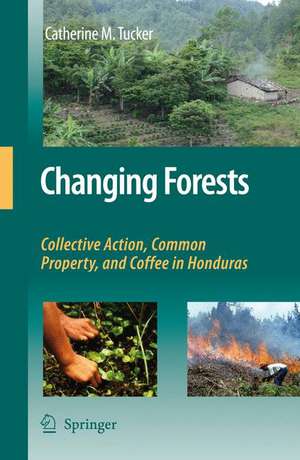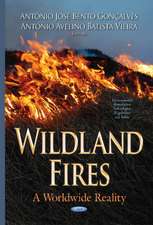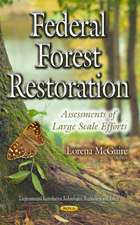Changing Forests: Collective Action, Common Property, and Coffee in Honduras
Autor Catherine M. Tuckeren Limba Engleză Hardback – 3 apr 2008
Growing social heterogeneity, population growth, and market integration present challenges for sustainable forest management, but satellite images show that forest cover has expanded since the community prohibited logging in 1987. The indigenous people have created a watershed reserve and agroforestry cooperatives, and maintain forests as part of a resilient livelihood strategy.
| Toate formatele și edițiile | Preț | Express |
|---|---|---|
| Paperback (1) | 639.41 lei 6-8 săpt. | |
| SPRINGER NETHERLANDS – 19 oct 2010 | 639.41 lei 6-8 săpt. | |
| Hardback (1) | 645.60 lei 6-8 săpt. | |
| SPRINGER NETHERLANDS – 3 apr 2008 | 645.60 lei 6-8 săpt. |
Preț: 645.60 lei
Preț vechi: 759.54 lei
-15% Nou
Puncte Express: 968
Preț estimativ în valută:
123.55€ • 128.51$ • 101.100£
123.55€ • 128.51$ • 101.100£
Carte tipărită la comandă
Livrare economică 14-28 aprilie
Preluare comenzi: 021 569.72.76
Specificații
ISBN-13: 9781402069765
ISBN-10: 1402069766
Pagini: 276
Ilustrații: XVI, 258 p.
Dimensiuni: 155 x 235 x 28 mm
Greutate: 0.56 kg
Ediția:2008
Editura: SPRINGER NETHERLANDS
Colecția Springer
Locul publicării:Dordrecht, Netherlands
ISBN-10: 1402069766
Pagini: 276
Ilustrații: XVI, 258 p.
Dimensiuni: 155 x 235 x 28 mm
Greutate: 0.56 kg
Ediția:2008
Editura: SPRINGER NETHERLANDS
Colecția Springer
Locul publicării:Dordrecht, Netherlands
Public țintă
ResearchCuprins
People and Forests in Historical Perspective.- Governing the Commons and Making a Living.- Logging Comes to La Campa: State Intervention, Forest Transformation, and Collective Action.- Common-Property Transformations and Market Integration.- Coffee Culture, Crisis, and Adaptation.- Changing Lives, Changing Forests: Many Ways to Build a Future?.
Recenzii
From the reviews:“A principal argument in the book is that the community’s relative success in maintaining forests is due to institutional factors that have been found elsewhere to lead to successful common property management … . Changing Forests is intended for environmental scientists and policymakers, conservationists, social foresters, ecological and environmental anthropologists and economists, sociologists, geographers, development analysts, and Latin America specialists. … It is particularly important for those concerned with collective action and common property and is a worthy addition to libraries … .” (Patricia L. Howard, Mountain Research and Development, Vol. 29 (4), November, 2009)
Textul de pe ultima copertă
Drawing on ethnographic and archival research, "Changing Forests" explores how the indigenous Lenca community of La Campa, Honduras, has conserved and transformed their communal forests through the experiences of colonialism, opposition to state-controlled logging, and the recent adoption of export-oriented coffee production. It merges political ecology, collective-action theories, and institutional analysis to study how the people and forests have changed through socioeconomic and political transitions. It studies the complex, often contradictory relationships between the people and their natural resources to understand why forest cover endures.
The discussion of social and forest transformations in La Campa focuses on the past three decades, but the context for understanding the Lenca people and their forest use stretches over 500 years. Although the historical record has many gaps, the initial conditions for human-forest relationships were established in the colonial period, when La Campa was founded and processes of conquest ruptured the social fabric. "Changing Forests" therefore encompasses three broad phases: (1) the premodern period, which considers historic perturbations in western Honduras from the period of colonialism into the middle of the twentieth century; (2) the period of state-led logging and intervention in La Campa, which caused major degradation in forest cover; and (3) the recent period in which export coffee production transformed property rights, and people’s perceptions of the forest gained new conservationist and economic dimensions. Each phase entails perspectives and experiences that influenced human use of forests, and shaped subsequent transformations.
Growing social heterogeneity, population growth, and market integration present challenges for sustainable forest management, but satellite images show that forest cover has expanded since the community prohibited logging in 1987. The indigenous peoplehave created a watershed reserve and agroforestry cooperatives, and maintain forests as part of a resilient livelihood strategy.
La Campa has been recognized by the Honduran government for its forest conservation efforts.
The discussion of social and forest transformations in La Campa focuses on the past three decades, but the context for understanding the Lenca people and their forest use stretches over 500 years. Although the historical record has many gaps, the initial conditions for human-forest relationships were established in the colonial period, when La Campa was founded and processes of conquest ruptured the social fabric. "Changing Forests" therefore encompasses three broad phases: (1) the premodern period, which considers historic perturbations in western Honduras from the period of colonialism into the middle of the twentieth century; (2) the period of state-led logging and intervention in La Campa, which caused major degradation in forest cover; and (3) the recent period in which export coffee production transformed property rights, and people’s perceptions of the forest gained new conservationist and economic dimensions. Each phase entails perspectives and experiences that influenced human use of forests, and shaped subsequent transformations.
Growing social heterogeneity, population growth, and market integration present challenges for sustainable forest management, but satellite images show that forest cover has expanded since the community prohibited logging in 1987. The indigenous peoplehave created a watershed reserve and agroforestry cooperatives, and maintain forests as part of a resilient livelihood strategy.
La Campa has been recognized by the Honduran government for its forest conservation efforts.
Caracteristici
Shows how market integration and population growth can facilitate forest conservation Considers 500 years of a community’s relationships with its forests Reveals that dynamism in forest-cover use can be a component of resilience for people and forests Examines how coffee producers in one community survived the coffee crisis through diversification, organized groups, and use of social networks Explores how an indigenous community has conserved forest cover despite rapid social and economic change, and the unanticipated consequences Considers how people may develop conservationist values through the experience of environmental degradation Addresses forest use and management as components of economic development and social change Examines how common-property forests became privatized and the mixed ramifications for the community and its forests Includes supplementary material: sn.pub/extras









